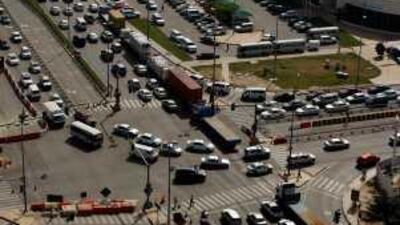ABU DHABI // It will take more than making driving more expensive to get people out of their cars and onto mass transit, some people have told the Abu Dhabi Department of Transport (DoT). Anti-congestion measures being considered by the department such as road tolls and costlier fuel, parking and vehicle registration would only affect lower-income people and not change other motorists' behaviour, said some members of focus groups organised by the department.
The DoT has said such measures may be needed to create a significant shift away from cars to rail and bus. "Who would be most affected? Working people - only the rich can afford to keep cars with these proposals," said one Asian woman. "They are suggesting these new means of transport to make life easier for people, so why do they want to do these things to make life harder for everyone?" said one expatriate Arab man.
People should be encouraged to use public transit through advertising and education campaigns instead, some suggested. The report on the interviews with 10 focus groups of residents, held in November, was recently posted on the department's website. Emirati men, Emirati women, expatriate Arab men, expatriate Arab women, expatriate Asian men, expatriate Asian women, expatriate Westerners, Emirati male students, Emirati female students and lower-income workers were all questioned on the issues that would influence their use of public transit.
The consultations were held to involve the public in the drawing up the surface transport master plan, which was unveiled to the public earlier this month. A detailed technical report is expected in the next two weeks. The plan, to be implemented in five-year phases until 2030, includes a high-speed metro line and a network of trams, buses and ferries that will put public transit within a five-minute walk for all residents.
The DoT expects that it will be difficult to establish the mass transit system as an accepted mode of transport. Yet for the plan to be a success, it will be necessary to get a significant number of people from all segments of society to start using public transit. "A scenario whereby lower-middle class white collar, blue-collar and labouring classes switch to public transport leaving the roads and parking spaces free for the use of wealthier car drivers is not a realistic one, given the expectation of a significantly expanded population," the report said.
The DoT has included measures to discourage the use of cars in its master plan but said it would not implement them until alternative transport was available. A parking management programme is to be unveiled in June that is expected to include a timetable for rolling out pay-and-display meters and building multi-storey car parks. Members of the focus groups were also queried on when and why they would use the different modes of transport, whether there should be segregation of men and women and how it should be done, and how they would feel about the introduction of a park-and-ride system.
While almost all of them said they were looking forward to and would try the new transit options, Emiratis and some wealthier expatriates, are expecting a high standard of convenience, speed, comfort and safety. How to segregate males and females sparked long discussions, with the consensus favouring reserved seating for women and perhaps a glass partition on metros to separate the sexes. Separate carriages for families could feature on the regional rail system.
Young Arab women wanted visible security features on public transit, such as CCTV systems and uniformed security staff. The department will be watching with interest the opening of the metro in Dubai, where there will be separate carriages for "gold class" ticket holders and for women. The Roads and Transport Authority also recently launched a women-only bus service. Residents spoken to yesterday echoed the focus groups' opposition to road pricing, though some, such as Abdullah Ali Alsuwaidi, 25, felt it was necessary to ease congestion on Abu Dhabi island.
"There is a congestion problem and if it is not too much I think it will help." Meanwhile, women who currently use public buses thought there should be more space for them. Brenda Hurst, 39, from Mumbai, favoured a separate minibus for women. "Sometimes men crush us because everyone wants to travel at the same time," she said. The report also revealed that the department received more than 1,000 e-mails with feedback and 477,694 hits to the plan's website, www.transportabudhabi.ae, between May 2008 and January. Also, 11 experts from around the world were invited to Abu Dhabi for three days to offer their suggestions.
The master plan is to be the focus at the Urban Transportation 2009 conference in Abu Dhabi on Sunday. mchung@thenational.ae

